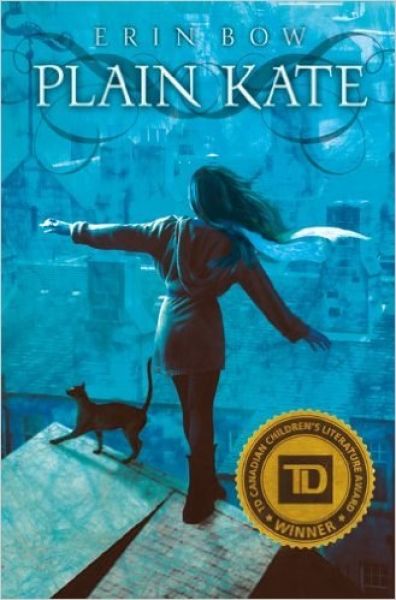Because You’re Mine
Plain Kate
By Erin Bow

3 Feb, 2017
A Year of Waterloo Region Speculative Fiction
0 comments
American-born Canadian by choice Erin Bow is a physicist turned novelist, whose work has won the TD Canadian Children’s Literature Award, the CBC Canadian Literary Award, for the poems that became Ghost Maps, the Monica Hughes Award twice, once for The Scorpion Rules and once for Sorrow’s Knot, the CLA Book of The Year for Young Adults for The Scorpion Rules. Shortlists include the Pat Lowther (for Ghost Maps), the Amy Mathers Award (for The Scorpion Rules) and currently the White Pine (for The Scorpion Rules) and the Sunburst (once for Plain Kate and once for Sorrow’s Knot). More details on Bow can be found at her website.
2012’s secondary world fantasy Plain Kate is a stand-alone young adult novel. Young adult fiction is a lot like juvenile science fiction, except that teens actually buy and read young adult fiction.
Plain Kate to her neighbours in the village of Samilae, Katerina Carver is beautiful to her doting father. She demonstrates a talent for wood-working as a toddler; in a better world she would have become her father’s apprentice as soon as she came of age. In the rather dismal world in which she lives, disease takes Kate’s father from her before he has a chance to give her the legal status of apprentice. The carver’s guild then steps in to take from Plain Kate virtually everything else her father owned.
Bereft of everything save her father’s tiny market stall, the clothes on her back, some tools and her skills, Plain Kate is forced into a hand-to-mouth existence.
The mysterious stranger will cost Plain Kate even that.
Linay offers Plain Kate a commission: repair his broken violin bow. What the magician really wants is Kate’s shadow. He offers her a wish in exchange — the rules of magic compel magicians to trade rather than steal what they covet — and when she refuses frames her as a witch to force her to trade with him. Desperate to escape Samilae before her superstitious neighbours can burn her, she agrees to the magician’s terms: her shadow in exchange for a few meagre travel goods and one wish.
Accompanied by her cat Taggle, who is delighted to discover his new powers of speech, Plain Kate accompanies a (something) of Roamers. The Roamers, culturally distinct and often scapegoats themselves, are not exactly welcoming but they will tolerate Plain Kate as long as she is useful. It is not a secure life but at least it is a life.
Not all of the Roamers are aloof. New friend Drina soon learns about Kate’s magical predicament. Many Roamers in Drina’s would turn on Plain Kate but Drina’s mother was burned as a witch. Not only is Drina sympathetic but she has enough magic to cure Kate. Or Drina hopes.
Drina and Plain Kate barely have time to recover from their nearly fatal rite when a much greater menace manifests itself. Something dark and evil is making its way downriver, leaving dead and dying in its wake. The Roamers are in its path. So is the town of Lov.
Kate has no magic of her own to oppose the evil. If she fails to stop it, her new friends will die.
~oOo~
I would like to say it was the last TD Canadian Children’s Literature Award WINNER stamp on the cover that attracted me to this but I didn’t notice it until I began to write this review. My powers of observation astound even me.
The Roamers are pretty obviously Romani. They even use the term “gadje” for outsiders. I’ve been known to grumble about causeless Romani in secondary world fantasies, Romani who somehow manage to exist despite the absence of their homeland in India in the secondary world in question. Kate’s village appears to be in a fantasy Eastern Europe; it seems reasonable to think Bow’s whole secondary world is based on ours, with magic added. Somewhere out there, well beyond the horizon of Kate’s awareness1 is an India.
It’s a good thing for the people of Lov (although not a coincidence) that the rusalka targeted the Roamers because as decent as Plain Kate is, it would be hard to make a case that she should risk her life for a bunch of mean, superstitious, violent peasants, particularly given what saving them will cost her. Saving her friends and their loved ones means accepting the unfortunate corollary that she will also save the lack-wits in Lov. To Kate’s credit, she doesn’t stop to think if the Lovians are even worth saving.
Bow shows the same willingness as Tanith Lee and Diana Wynne Jones to subject her protagonist to danger and injury, to demand as the price of survival horrifying coin. Victory, such as it is, is even more expensive. At the same time, Bow can be pretty funny, as any scene showing the drawbacks to owning a talking cat shows. Plain Kate ’s world is a harsh one but it is not a hopeless one.
Plain Kate is available here (Amazon) and here (Kobo).
1: Kate is of no use in this matter because she is so provincial that until she leaves, she has no need to know Samilae’s name. Place names only matter if you’re ever planning to visit somewhere else.
Please direct corrections to jdnicoll at panix dot com
